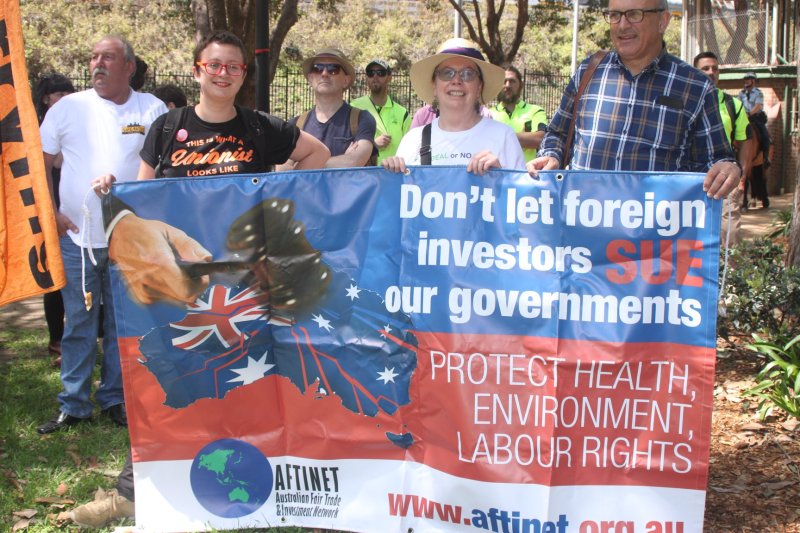- Negotiations

In the last two years the Australian Government has finalised bilateral trade agreements with China, Korea and Japan, which are now in force. The Trans-Pacific Partnership agreement between 12 Pacific Rim countries has been agreed, but is being reviewed by a Parliamentary committees before Parliament votes on the implementing legislation. The TPP will not come into force until six of the 12 countries including the US and Japan pass the implementing legislation, which is expected to take two years.
The current conservative Coalition government has agreed to include Investor-State Dispute Settlement (ISDS) provisions in the Korea and China bilateral FTAs as well as the TPP. ISDS allows foreign companies to bypass national courts and sue governments for compensation if they can argue that a change in law or policy harms their investment. The previous Labor government had a policy against ISDS, and even a previous Coalition government did not include ISDS in the Australia-US free trade agreement in 2004.
There is widespread opposition in the Australian community to the inclusion of ISDS in the TPP. The TPP is also controversial because it extends monopoly rights on expensive life-saving biologic medicines, which will mean more years of very high prices before cheaper versions become available. There are also grave concerns about its impacts on food labelling standards and expanded access for temporary workers without additional protection of workers’ rights. A recent World Bank study found that Australia was only likely to gain almost no economic benefit from the deal.
Australia is currently involved in multilateral negotiations towards the PACER-plus agreement with New Zealand and 14 Pacific Island countries, the Regional Comprehensive Economic Partnership (RCEP) and the Trade In Services Agreement (TISA). It is also negotiating bilateral trade agreements with India and Indonesia and will begin talks with Hong Kong and Taiwan later this year and the EU next year.
Contributed by AFTINET
last update: May 2016
Photo: AFTINET
19-Feb-2009
9News
Australia and Indonesia are tipped to give the green light to talks on a free trade deal as ministers from both countries gather in Sydney to consider ways to enhance already strong ties.
11-Feb-2009
AFN
The Australia-Chile Free Trade Agreement is set to come into force on 6 March, 2009, allowing a host of Australian exporters a greater opportunity to enter a growing market.
2-Feb-2009
AAP
South Korea and Australia have taken another step towards signing a free trade agreement (FTA), despite the ongoing global economic crisis.
21-Dec-2008
The Hon Simon Crean MP
Australia and Korea have concluded preparatory talks on a bilateral free trade agreement (FTA).
17-Dec-2008
Rethinking globalisation
The Australian Parliamentary Library has released a background note analysing Australia’s bilateral free trade agreements (FTAs) which shows how clearly destructive they have been (although the analysis is only from an economic perspective).
28-Nov-2008
Watermelon Blog
I rarely go into town these days, and when I have to I try to make the trip worthwhile by doing as many things as I can while I’m there. Kevin Rudd obviously thinks the same way, because when he goes off to these conferences overseas he tries to pack a lot in.
19-Nov-2008
Weekly Times
Australian horticulturalists have launched a scathing attack on the Federal Government following its vote to allow free trade with Chile.
16-Oct-2008
The Federal Parliament’s treaties committee has called for the Government to set out its objectives before entering into negotiations on any future Free Trade Agreements (FTA).
17-Sep-2008
Weekly Times
Horticulture has been the sacrificial lamb in the Chilean Free Trade Agreement, Australian industry leaders say.
20-Aug-2008
Mondaq
The AC-FTA represents a new generation of Free Trade Agreements and establishes a broad level of market access. Australian companies are certain to benefit,





